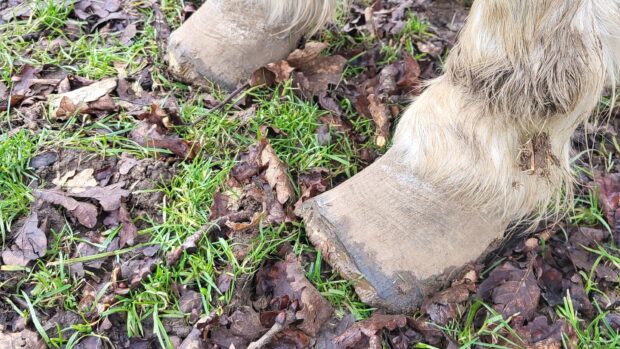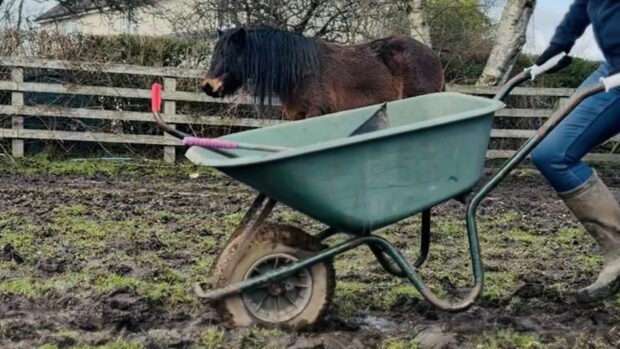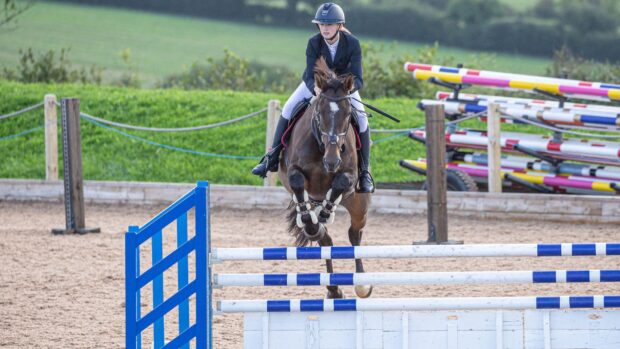A competition rider who took horses on livery but “chose to allow them to suffer”, World Horse Welfare said, to the point one was put down, another was emaciated and a third barely able to walk, has been given a suspended prison sentence — but no ban from keeping horses.
Kate Greenhalgh, of Spinney North, Pulborough, took horses for grass livery as part of her business KG Equestrian. The 30-year-old pleaded guilty to causing suffering to four horses, and was sentenced at Brighton Magistrates’ Court on 8 June.
The RSPCA was called to the location in March 2020, after reports from concerned members of the public about a collapsed horse in the field.
RSPCA national equine coordinator Becky Carter and inspector Kate Barnes, and World Horse Welfare chief field officer Claire Gordon arrived to be told the horse, an Irish draught called Kai, had been put down and his body removed. During their visit, they discovered the poor condition of other horses in the surrounding fields.
Kai’s owner Nikki Cochran told H&H she had wanted to buy a foal from breeder Jane George for 10 years, and that finally being able to do so was a “dream”.
“I went to see him when he was about two weeks old, and we agreed I’d have him,” she said. “I didn’t bring him home quickly as I wanted to find the perfect place for him.”

Kai
Kai, and filly Caoimhe for Nikki’s daughter, stayed at their breeder’s until they were 18 months old, when they were taken to Greenhalgh’s yard on livery.
“She came so highly recommended; I wanted to find the best possible place for them,” Nikkie said. “That clearly didn’t work.
“Lots of friends had recommended her, and when we went to see the yards, there were big fields, natural shelter, good fencing; it looked like the perfect place for two youngsters.”
Nikki, who has owned horses since she was 16, said she quizzed Greenhalgh at length, and had “textbook answers” to her questions.
The horses were moved in October, and Nikki regularly made the hour’s drive to check them, and never saw anything amiss. Over Christmas, the youngsters were moved to a yard of Greenhalgh’s nearer the family’s home, so they could handle and spend time with them every day.
In the new year, the horses moved back to the original fields.
“Then my husband became very ill,” Nikki said. “He was in intensive care for some weeks, through February, which is why we weren’t seeing the horses — and she knew. She’d message me saying they were doing well, thriving, “they’re two-year-olds now”, and I had no reason to doubt her.”
Nikki said the day after her husband left hospital, Greenhalgh called at about lunchtime to say she was concerned about Kai; she thought he might have a tooth abscess as he was not eating properly.
“I said it was fine to get the vet, and did she need me to come,” Nikki said. “I was worried about leaving my 15-year-old daughter with her dad who’d just come out of hospital, but Kate said fine, and she’d manage. She then rang me at 10pm to say Kai had gone down, the vet was there and they couldn’t get him up.”
Nikki was told the vet had made Kai comfortable, and that Greenhalgh would stay with the horse overnight.
“I trusted them,” Nikki said. “The next day, at first light, I went there, and made my way up this quagmire of a field to find Kai lying there.
“The vet said we might have a 10% chance if we could get him to Liphook [equine hospital], or we could let him go then. I said I couldn’t just let him go, I wanted to try, and the fire brigade got him up but as soon as they did, he started suffocating on the fluid that had accumulated in his lungs while he was down.”
A post-mortem showed Kai’s poor bodily condition had likely caused his death.
Caoimhe survived and is now a healthy three-year-old.
“She’s amazing,” Nikki said. “But every little milestone, everything she does; he should be there too. They were the last foals Janet bred; she’s retired now and gelded her stallion.”
Nikki said she suffered a breakdown after Kai’s death, and had to take four months off work.
“I’m still struggling,” she said. “I’ve never seen my husband as upset as when he had to tell me she’d starved them. We’ve moved away and have the horses at home now; I can’t bear the thought of anything happening to them.”
“All this happened at a time when we were struggling so much as a family, and she had options. She could have said it was too much, to take them away because she couldn’t cope. She could have asked for more money if it wasn’t enough; I’d have done whatever it took, and fed every horse in that field if it meant mine would still be here. But she didn’t do any of that, and then she lied. She made the whole awful situation the worst it could possibly be.”
In a statement to court, Nikki said: “There is no possibility of even coming close to that wonderful, cuddly but timid, hugely loving and trusting chap, who went from hiding in the back of his stable when I visited Shropshire, to following me around like a big Labrador without a lead. I watched him change from bright chestnut to light chestnut, to grey. I measured his height in delight speculating on how tall he would become.
“But I’ll never know what colours he would have changed through or how tall he would have become because Kate Greenhalgh starved him. It torments me wondering if he stood there starving and neglected and wondered why I didn’t come for him. I dream about him lying there in the mud before the hay was brought to him. Most of all I see his sweet little face wondering why I didn’t save him from her neglect.
“Kai was my dream horse of a lifetime and she turned that dream into our worst nightmare and we are all still living with the fallout.”
The RSPCA’s Ms Carter said when they arrived at the site, she and Ms Gordon checked the other horses and found one, Adelaide, and a colt, in very poor condition.

“A third horse, Val, was totally emaciated,” she said. “Adelaide and Val were also suffering from really severe mud fever and rain scald — they had a lot of hair loss and sores on their coats and legs.
“The young colt was so lame he couldn’t bear weight on one leg and could barely walk. He had a very elevated heart rate, indicating he was in significant pain. The vet discovered he had an abscess in his foot which he predicted had been in this condition for over a week, as the infection had traveled up the horse’s leg and had to be drained of a large amount of pus.
“They certified all three horses to be suffering and the police agreed for us to remove them.”
Greenhalgh told the courts she had made the horses’ owners aware of their conditions, and that one horse had been seen by a vet, but the court heard she did not follow the vet’s advice. She provided evidence of buying food and hay for the animals, but admitted failing to provide the horses with a suitable diet, as well as adequate parasite control, and admitted failing to investigate and address their weight loss.
Ms Carter added: “This was such a sad case to investigate as the poor health of the horses could have been avoided with appropriate care, and by following vet advice. These horses were under the care of Greenhalgh, who is a competition rider, as part of a professional arrangement through her business, where she would take on horses on livery for backing, competing and sales.
“It’s particularly sad for the horses’ owners as they were under the impression their animals were being looked after. Thankfully, Adelaide, Val and the young colt were returned to their owner and have made a good recovery.”
Continues below…

‘Cancel out cruelty once and for all’: tougher sentences for animal abusers made law four years on
“This reform is long overdue – for many years, the most violent and horrific abuse and cruelty received a maximum

Couple filmed pinning down foal and beating him with pipe as they tried to ‘train’ him
The foal was 11 months old at the time of the incident

Subscribe to Horse & Hound magazine today – and enjoy unlimited website access all year round
Ms Gordon said she was pleased Greenhalgh pleaded guilty, acknowledging the failings in her care.
She added: “She is an experienced equine professional who failed to recognise that she had taken on more than she could manage and rejected offers of help from those concerned around her ultimately resulting in the horses in her care suffering unnecessarily. These horses had owners they could have been returned to, if she had acknowledged that she was not coping but instead she chose to allow them to suffer.”
Greenhalgh was sentenced to 12 weeks’ imprisonment, suspended for 12 months, and must complete 120 hours of unpaid work and 10 rehabilitation sessions. She was ordered to pay costs of £750, a victim surcharge of £128, and compensation to an owner of one of the horses, of £3,650.
Nikki said: “I’m absolutely gutted by that sentence. The one thing that’s pulled my daughter and I through the last 15 months was the thought that after this, we wouldn’t have to have nightmares about the horses in her care any longer, but now that’s not the case.
“She can carry on, and there will be people who don’t read articles and don’t have Facebook and will still send their horses to her.”
Horse & Hound magazine, out every Thursday, is packed with all the latest news and reports, as well as interviews, specials, nostalgia, vet and training advice. Find how you can enjoy the magazine delivered to your door every week, plus options to upgrade to access our H&H Plus online service which brings you breaking news as it happens as well as other benefits.




